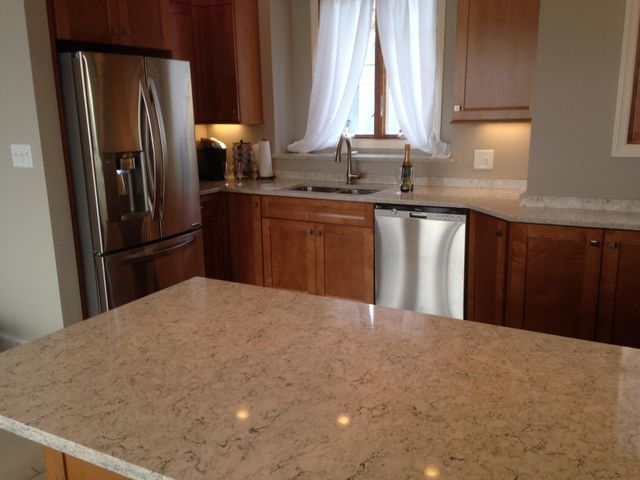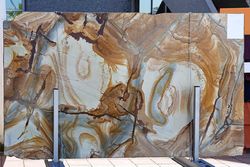Engineered vs. Natural Stone Countertops: What’s the Difference?

Most kitchen renovations involve choosing new counters. There are numerous options available, including engineered and natural stone countertops. But while granite and quartz both sound natural, only one is quarried from the earth. If you aren’t sure what the differences are and which option is right for you, keep reading.
The Differences Between Engineered & Natural Stone Countertops
How They Are Made
Granite is one of the most popular natural stone countertop materials and is a combination of molten rock and a variety of minerals, including quartz, feldspar, topaz, and garnet. It’s quarried directly from the earth in large slabs, which are then sliced into thinner ones that are used to make countertops.
Engineered stone like quartz consists of mostly natural stone, but it also includes resin. Countertops made from quartz are manufactured in a lab, where a mixture of about 93% ground stone is mixed with about 7% resin and added pigment for color. Slabs are then cut from the manufactured material and polished to create quartz counters.
Varied Consistency in Aesthetics
 At first glance, you may have a hard time distinguishing engineered from natural stone countertops. If you look closely, however, the consistencies of the colors and patterns are dead giveaways. Because granite counters are cut from large slabs quarried directly from the earth, they have unique colors and patterns. While the overall color of the countertops may appear brown or gray, you’ll see streaks of gold or white in certain spots and none in others.
At first glance, you may have a hard time distinguishing engineered from natural stone countertops. If you look closely, however, the consistencies of the colors and patterns are dead giveaways. Because granite counters are cut from large slabs quarried directly from the earth, they have unique colors and patterns. While the overall color of the countertops may appear brown or gray, you’ll see streaks of gold or white in certain spots and none in others.
Quartz counters, on the other hand, have consistent coloring and patterns. You can purchase them from a catalogue and know what you’ve chosen is exactly what will be installed in your kitchen. With engineered stone, you get a more uniform appearance.
Maintenance & Durability
Both engineered and natural stone countertops are durable and will last many years with the proper care. Granite can withstand temperature changes, so you can safely place a hot pot on your counters without causing damage. Despite appearing polished, however, granite is porous, so it must be resealed once a year to prevent staining and other issues.
Engineered stone counters cannot withstand heat, so you must use trivets under all your hot pots and pans. They aren’t porous, though, so they’re lower maintenance than granite. Harsh chemicals like bleach may damage the finish, so you need to select your cleaning products carefully.
Both engineered and natural stone countertops have their own benefits and drawbacks. For most homeowners, the decision comes down to the aesthetic they want to achieve in their kitchen and the amount of maintenance they’re willing to do. If you need help deciding between granite and quartz counters, Rocky Mountain Granite & Marble in Webster, NY, will help. With competitive pricing, a large selection of options, and expert installation, you can’t go wrong with their team of professionals. Visit their website to learn more, or call (585) 265-6610 to schedule an appointment.
About the Business
Have a question? Ask the experts!
Send your question

